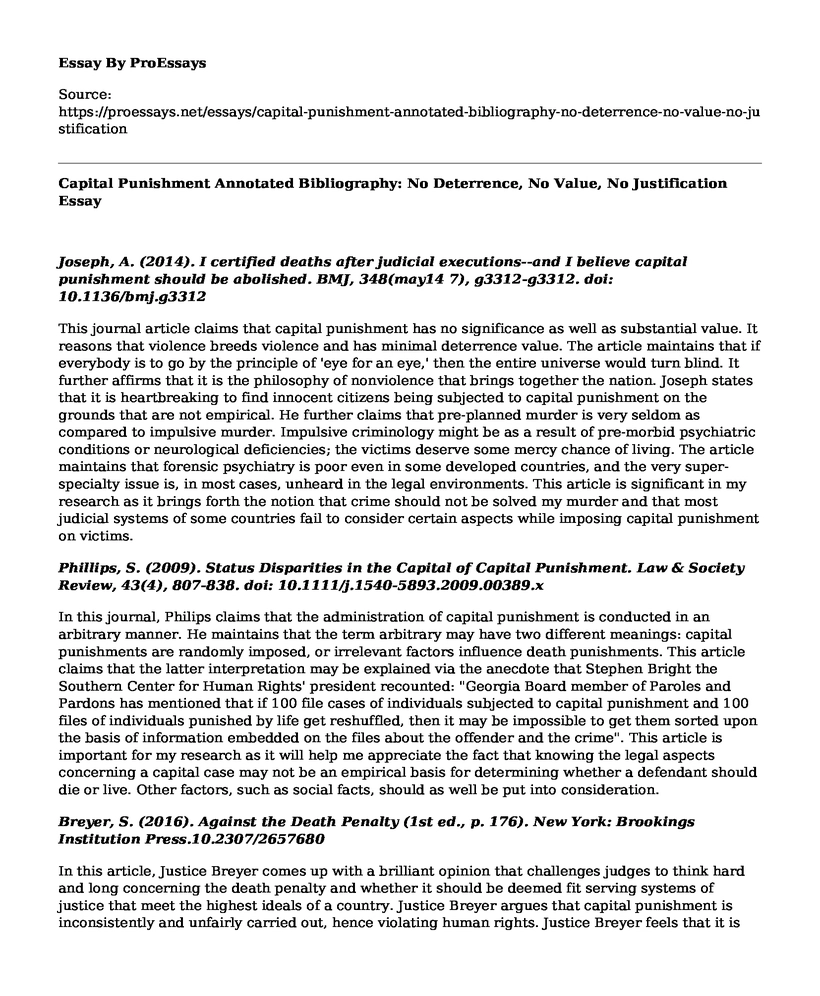Joseph, A. (2014). I certified deaths after judicial executions--and I believe capital punishment should be abolished. BMJ, 348(may14 7), g3312-g3312. doi: 10.1136/bmj.g3312
This journal article claims that capital punishment has no significance as well as substantial value. It reasons that violence breeds violence and has minimal deterrence value. The article maintains that if everybody is to go by the principle of 'eye for an eye,' then the entire universe would turn blind. It further affirms that it is the philosophy of nonviolence that brings together the nation. Joseph states that it is heartbreaking to find innocent citizens being subjected to capital punishment on the grounds that are not empirical. He further claims that pre-planned murder is very seldom as compared to impulsive murder. Impulsive criminology might be as a result of pre-morbid psychiatric conditions or neurological deficiencies; the victims deserve some mercy chance of living. The article maintains that forensic psychiatry is poor even in some developed countries, and the very super-specialty issue is, in most cases, unheard in the legal environments. This article is significant in my research as it brings forth the notion that crime should not be solved my murder and that most judicial systems of some countries fail to consider certain aspects while imposing capital punishment on victims.
Phillips, S. (2009). Status Disparities in the Capital of Capital Punishment. Law & Society Review, 43(4), 807-838. doi: 10.1111/j.1540-5893.2009.00389.x
In this journal, Philips claims that the administration of capital punishment is conducted in an arbitrary manner. He maintains that the term arbitrary may have two different meanings: capital punishments are randomly imposed, or irrelevant factors influence death punishments. This article claims that the latter interpretation may be explained via the anecdote that Stephen Bright the Southern Center for Human Rights' president recounted: "Georgia Board member of Paroles and Pardons has mentioned that if 100 file cases of individuals subjected to capital punishment and 100 files of individuals punished by life get reshuffled, then it may be impossible to get them sorted upon the basis of information embedded on the files about the offender and the crime". This article is important for my research as it will help me appreciate the fact that knowing the legal aspects concerning a capital case may not be an empirical basis for determining whether a defendant should die or live. Other factors, such as social facts, should as well be put into consideration.
Breyer, S. (2016). Against the Death Penalty (1st ed., p. 176). New York: Brookings Institution Press.10.2307/2657680
In this article, Justice Breyer comes up with a brilliant opinion that challenges judges to think hard and long concerning the death penalty and whether it should be deemed fit serving systems of justice that meet the highest ideals of a country. Justice Breyer argues that capital punishment is inconsistently and unfairly carried out, hence violating human rights. Justice Breyer feels that it is unconstitutional to impose capital punishment on individuals and that better approaches to dealing with crimes such as life imprisonment should be considered. This article is more suitable for everyone with interest in various issues that relate to capital punishment. This article, therefore, is very pivotal for my research in understanding the various dimensions of capital punishment.
Dieter, Richard C. "Capital Punishment is Too Expensive to Retain." The Ethics of Capital Punishment. Edited by Christine Watkins. Greenhaven Press, 2011, pp. 34-59.
This article argues that capital punishment is non-viable from economic, social, and moral perspectives. The author claims that most policy officers have refuted the deterrent theory of capital punishment. The other author's argument against capital punishment is that it is associated with too much cost on the state coffers. That is, a lot of resources end up being sent on just a few cases. Dieter argued that money spent on death penalties could be used in other vital developmental areas, and the murderer subjected to life imprisonment without parole. This article will be significant for my research as it put consideration on capital punishment and the associated economic impacts.
Cite this page
Capital Punishment Annotated Bibliography: No Deterrence, No Value, No Justification. (2023, Mar 29). Retrieved from https://proessays.net/essays/capital-punishment-annotated-bibliography-no-deterrence-no-value-no-justification
If you are the original author of this essay and no longer wish to have it published on the ProEssays website, please click below to request its removal:
- Expository Essay on Importance of Intellectual Property Protection
- Arrest Disregarding the Need for Quantum of Information Paper Example
- Essay Sample on Fourth Amendment: Search of Cellphones & Privacy Protection
- Plea Bargaining: An Inevitable Part of US Criminal Justice? - Essay Sample
- Federal & State Punishment: Restitution, Retribution, Incapacitation, Rehabilitation & Deterrence - Essay Sample
- Essay Sample on Cyber-Attacks: US Military vs Private Sector
- Criminal Justice System: Inequities in US Society Persist - Research Paper







